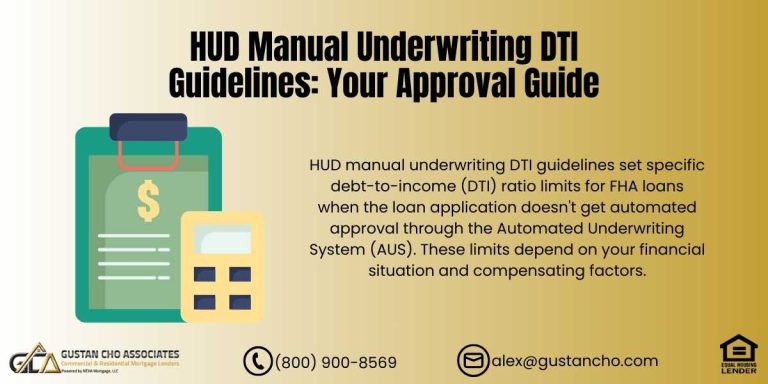This guide covers continuation of income guidelines of mortgage lenders. The ability to repay is one of the most important factors mortgage underwriters take into consideration when underwriting a mortgage borrower. Lenders require a past two-year employment work history. All agency guidelines require the mortgage underwriter document their due diligence in addressing they believe the borrower’s employment, thus income, has a likelihood to continue for the next three years.
Continuation of income guidelines may be periodically reviewed and adjusted to reflect changes in economic conditions or other relevant factors.
Gaps of employment as well as overall employment history need to be taken into consideration. The mortgage underwriter has a lot of underwriter discretion on determining continuation of income via underwriter discretion. The past two-years job history is important because it shows that the borrower had a history of working in the past two-years. Job gaps in the past two-years are allowed. However, underwriters want to see the reason for the gap in employment. More importantly, mortgage underwriters want to see the continuation of income of the borrower for the next three years. Mortgage underwriters want to feel confident that the borrower will be able to afford their housing payments.
What Are Continuation of Income Guidelines
Continuation of income guidelines typically refers to criteria or policies set by governmental or financial institutions to determine whether an individual or entity qualifies for continued financial assistance or support based on their income level. These guidelines are often used in welfare, unemployment benefits, social security, or other financial aid forms.
Continuation of income guidelines may include thresholds or limits on income levels that individuals or households must meet to continue receiving benefits or assistance.
Continuation of income guidelines aim to ensure that support is targeted towards those who need it most while preventing abuse or misuse of public funds. The specific criteria and thresholds for continuing income guidelines vary widely depending on the program or institution administering the assistance. When analyzing continuation of income, mortgage underwriters may consider household size, geographic location, and other demographic considerations. Talk to our expert about your issue in your loan, click here
Continuation of Income Guidelines on Mortgage Loan Programs
Continuation of income guidelines is similar for FHA, USDA, VA, Fannie Mae, Freddie Mae, Traditional Jumbo lenders, Nontraditional Jumbo lenders, Non-QM lenders, and portfolio lenders. However, each mortgage lender can have lender overlays on the continuation of income guidelines. Each lender can set additional overlays above and beyond the minimum continuation of income agency guidelines by HUD, USDA, VA, Fannie Mae, and Freddie Mac.
Each mortgage lender has its own continuation of income guidelines for its government and conforming loan programs. There are mortgage lenders with no overlays on the continuation of income guidelines.
Continuation of income guidelines is the same for all loan programs. Continuation of income guidelines means that the borrower’s source of income is likely to continue for the next three years. Continuation of income is more important than a borrower’s credit scores and/or current income. Lenders want to feel confident that the borrower is going to be able to make the new housing payment without any stress after they close on their home loan.
Do Every Lender Have The Same Continuation of Income Guidelines
Continuation of income required by mortgage lenders can vary from one lender to another lender, the mortgage program, and the borrower’s specific circumstances. Some general factors that lenders typically consider when evaluating a borrower’s income:
Stability of Income: Lenders typically prefer borrowers with stable income sources. This could include employment income from a full-time job, consistent self-employment income, or other regular income streams.
How Mortgage Lenders Verify Income
Lenders typically require documentation, such as W2s, employment verification, pay stubs, two years of federal income tax returns, profit and loss statements, business and personal bank statements, and other financial and income documents to verify income. They may also contact employers directly to verify employment status and income. What good is it if a borrower with excellent credit and great payment history is not able to afford their new mortgage payment. Lenders always want to know the borrower has the ability to repay their new mortgage payment.
Debt-to-Income Ratio (DTI)
Lenders assess borrowers’ ability to manage monthly payments by calculating their debt-to-income ratio. This is the ratio of the borrower’s monthly debt payments to their gross monthly income. Generally, a lower DTI ratio is more favorable to lenders.
Minimum Income Requirements
Lenders may have minimum income requirements to ensure borrowers have sufficient income to afford the mortgage payments. These requirements can vary depending on factors such as the size of the loan, the borrower’s credit score, and the type of mortgage.
Additional Income Considerations
Lenders may also consider other sources of income, such as rental income, investment income, alimony, or child support. However, they may require documentation to verify these income sources and apply certain restrictions or adjustments.
Future Income Potential
Lenders may also consider the borrower’s future income potential, especially if there are expected changes in employment or income shortly. For example, suppose a borrower is due for a significant raise or promotion. In that case, the lender may consider this when evaluating their ability to repay the loan. Borrowers must be transparent about their income and provide accurate documentation to the lender during the mortgage application process. This helps ensure the lender can make an informed decision about the borrower’s ability to afford the mortgage payments.
Continuation of Income Guidelines on Full-Time Jobs
The key question mortgage underwriters want to know is how is the continuation of income of the borrower’s current job. What good is it if the borrower was making six figures for the past several years but the income will be discontinued in the coming months. One of the issues facing many borrowers when applying for a mortgage when retiring is giving notice of their retirement.
If borrowers are planning on using their income as qualified income and are giving notice to their company they are retiring soon, then their income will not continue for the next three years.
This will automatically disqualify the borrower for a mortgage with their full-time income. In these type of cases, the borrower may qualify with their pension income but not full-time income if they are planning on retiring.
Click here to apply for mortgage loans
Continuation of Income Guidelines on Irregular and Declining Income
Mortgage Underwriters are often concerned with irregular or declining income of borrowers. It is up to the mortgage underwriter to use their discretion on whether or not to count irregular or declining income of borrowers. In most cases, mortgage underriters will not count irregular or declining income unless the continuation of income for the next three years is likely.
Part-time income, overtime income, and other income are allowed as qualified income if the borrowers has a two-year history of part-time income, overtime income, or other income.
If the borrower has a history of working part-time, second job, or other job for two years of consistent income, without the income being irregular or declining, the borrower is allowed to use that income as qualifying income. The key component of continuation of income guidelines is the likelihood of part-time, bonus income, overtime, second full-time job income, or other income is likely to continue for the next three-years. For more information about the contents of this article or other mortgage-related topics, please contact us at Gustan Cho Associates at 800-900-8569 or text us for a faster response. Or email us at gcho@gustancho.com. The team at Gustan Cho Associates is available 7 days a week, evenings, weekends, holidays.









